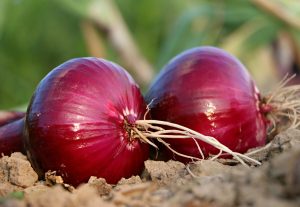
Onions are a kitchen staple found in nearly every home around the world. They are one of the most versatile vegetables, lending their flavor to many different dishes. Onions are also incredibly nutritious, offering a variety of vitamins, minerals, and other health benefits.
Benefits of Onions
Onions are often referred to as a “superfood” due to their wide array of health benefits and are an essential component of many dishes. Although onions are not a food that everyone enjoys, there are many benefits to incorporating them into your diet.
One of the most significant benefits of onions is their nutrient content. Onions are a good source of vitamins and minerals, including vitamin C, folate, and potassium. They are also high in dietary fiber, which is important for maintaining regularity, digestion, and overall health. Furthermore, onions contain a wealth of antioxidants, including quercetin and sulfur compounds, that help protect the body from disease-causing free radicals.
Regular consumption of onions can also help to lower cholesterol levels and reduce the risk of heart disease. Onions contain a compound known as allicin, which has been found to reduce bad cholesterol and triglyceride levels, while increasing the levels of good cholesterol. This can help to reduce the risk of heart disease and stroke.
Onions can also help reduce the risk of certain cancers. Studies have shown that the sulfur compounds and quercetin found in onions may help to prevent the growth of cancer cells. Additionally, onions contain organosulfur compounds, which have been found to inhibit the growth of tumors.
In addition to their numerous health benefits, onions are also known for their therapeutic effects. The oils found in onions may help to reduce inflammation and pain, making them a great choice for those with arthritis or other chronic pain conditions. Additionally, onions may help to reduce the symptoms of colds and flu, as they contain antiviral and antimicrobial properties.
Aside from their therapeutic benefits, onions also offer a wide range of culinary uses. They can be used to enhance the flavor of dishes, as well as act as a base for soups, stews, and sauces. Onions can also be cooked, roasted, and grilled to add flavor to various dishes. Furthermore, onions can be sautéed to make a flavorful base for dishes such as stir-fries and curries.
History of Onions
Most people take onions for granted, but they have been a part of human history for thousands of years. Onions have been around since ancient times, and they were one of the earliest vegetables cultivated by humans. They are believed to have originated in the Middle East and Central Asia and were likely first cultivated by the Sumerians in the Tigris-Euphrates valley about 5000 BC. They began to spread to other parts of the world by way of trade and exploration.
The ancient Egyptians were particularly fond of onions and kept them in their diets since around 3500 BC. They also believed that onions held magical powers and that eating onions could provide protection from evil forces. Onions were even entombed with pharaohs as part of their burial ritual. The Greeks and Romans also included onions in their diets, and they were even used as currency in some parts of the ancient world.
Onions have been a popular food item in Europe since the Middle Ages. They were frequently used in cooking because they were both affordable and widely available. Onions were also used medicinally to treat a variety of ailments such as congestion and sore throats.
Onions arrived in the Americas with the early settlers. They quickly became a staple food item, and they were used to make dishes such as onion soup and onion pies. Onions even made their way into traditional Native American cuisine.
In modern times, onions are a key ingredient in many dishes around the world. They are most commonly used to add flavor and depth to dishes such as soups, stews, and sauces. Onions are also common ingredients in salads, stir-fries, and casseroles. Onions are also a popular ingredient in pickles, relishes, and salsas.
Onions are also a popular ingredient in many beauty products. Onion juice has been used to treat a variety of skin conditions for centuries, and onions are still used today to give hair shine and promote healthy scalp and follicles.
Onions are one of the most versatile vegetables and have been a part of human history for thousands of years. They have been used for both culinary and medicinal purposes throughout history, and they remain an important part of many cuisines around the world today. The next time you enjoy an onion-based dish, remember that you are partaking in a time-honored tradition that has been around for centuries.
Cooking with Onions

Onions are one of the most versatile ingredients in a cook’s kitchen. Whether you’re making a simple side dish or a complex entrée, onions add flavor, texture and color to any dish. Here are some tips for cooking with onions.
First, let’s talk about the different types of onions. There are yellow onions, white onions, red onions, sweet onions, shallots, scallions, and leeks. Each type has a different flavor and texture, so it’s important to choose the right onion for the dish you’re making. For example, yellow onions are sharp and pungent, while sweet onions are milder and better for dishes that require a subtle onion flavor.
When it comes to prepping onions, it’s important to know how to cut them properly. For most dishes, you’ll want to slice the onions into thin rings or strips. Make sure to use a sharp knife and be careful not to cut yourself. If you’re using a larger onion, you can cut it into half moons or cubes. It’s also helpful to have a pair of gloves on hand to protect your hands from the onion’s strong odor.
Onions can be cooked in a variety of ways. You can sauté them in oil or butter until they’re golden brown and caramelized. You can also roast them in the oven or grill them for a smoky flavor. For dishes that require longer cooking times, you can simmer onions in a liquid, such as broth or wine, to add flavor to the dish.
When it comes to adding onions to your dish, there are a few things to keep in mind. Start by adding the onions to the pan with some oil or butter and cook over medium heat. If you’re adding them to a soup or stew, you can add them at the beginning of the cooking time. If you’re adding them to a stir-fry or another dish that requires quick cooking, add them at the end.
Onions can be a great way to add flavor and texture to any dish. With the right type of onion and the proper cooking techniques, you can easily transform any dish into a flavorful masterpiece. So put on those gloves and get cooking with onions!
Clinical Trials on Onions
In recent years, there has been an increased interest in the potential medicinal properties of onions. As a result, clinical trials have been conducted to examine the health benefits and risks associated with onions.
The majority of clinical trials conducted on onions have focused on the potential health benefits they may offer. For example, onions are rich in antioxidants, which may help to protect against chronic diseases such as cancer and heart disease. They also contain compounds that can help to reduce inflammation and reduce the risk of atherosclerosis.
Additionally, onions are believed to have anti-diabetic effects. Studies have shown that consumption of onions can help to lower blood sugar levels and reduce the risk of diabetes. Onions also contain compounds that can help to reduce the risk of obesity, as well as improve gut health.
Other studies have looked at the effects of onions on the immune system. A recent study found that supplementing with onions could potentially increase the number of natural killer cells and reduce inflammation. This could be beneficial for those who suffer from chronic illnesses such as rheumatoid arthritis and asthma.
In addition to the potential health benefits of onions, there are some risks associated with the consumption of onions. For instance, onions can cause irritation to the gastrointestinal tract, which can lead to nausea, vomiting, and diarrhea. Eating onions can also cause an allergic reaction in some people. Therefore, it is important to consult with a doctor before adding onions to your diet.
Overall, the evidence suggests that onions can offer a number of potential health benefits. However, it is important to understand the potential risks associated with the consumption of onions, as well as the limitations of the existing evidence. If you are considering adding onions to your diet, it is best to speak with a doctor first.